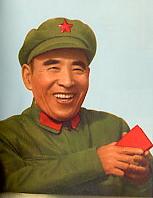
|
Long March Leaders
Marshal Lin Biao Lin was born October 7, 1907, in a Lin Family village in Hubei Province, where his father ran a small factory that was ruined by a Warlord's extortion. Graduating from Whampoa Military Academy in 1926, he joined the Guomintang (the Nationalist People's party), in 1924, and the Chinese Communist party in 1925. In 1927, when Chiang Kai-shek, generalissimo of the Kuomintang army, began a purge of Communist party members, Lin Biao defected with his regiment to the guerrilla headquarters of Mao Zedong (Mao Tse-tung). Lin Biao (pronounced Leen Bee-Ow) was ten years younger than Peng and in many ways the opposite of Peng. He was rather slight, oval faced, olive skinned, dark, and handsome. He kept his distance from his troops. To many, he seemed shy and reserved. His fellow commanders regarded him as a loner; many felt he was a hypochondriac and a neurotic. There are no stories reflecting warmth and affection for his troops. His fellow Red Army commanders respected Lin but when he spoke it was all business. Lin fought good battles and was a fine military commander. Lin was the darling of Mao and before that of Chiang Kai-shek. Lin, in 1932, at the age of 27 commanded the First Army during the Long March (1934-35). He never launched a battle unless he was certain he could win. He had a reputation for daring and deception. Lin specialized in feints, masked strategy, surprises, ambushes, flank attacks, pounces from the rear. |
|
| Marshal Lin Biao | ||
|
After the Japanese surrender Lin Biao mopped up the Nationalist forces in Manchuria, besieged Beijing and captured Tianjin. Lin who had opposed China's entry into the Korean War was Mao's first choice to command the Chinese "volunteers" in Korea but Lin pleaded illness and flew off to Moscow for treatment. Lin was named vice-premier of the state council in 1954, vice-chairman of the party in 1958, and defense minister in 1959, and he was proclaimed the second-ranking member of the party in 1966. In the 1969 party charter Lin was designated the eventual successor to Mao, chairman of the Communist party. Minister and later his legal successor. No man lived in greater peril than one which Mao designated his heir apparent. Many of the Long March survivors would suffer at Lin Biao's hands during the Cultural Revolution. Many of the comrades would lose their lives through Lin's intrigues and many would endure years in prison and months of torture because of Lin Biao. Lin played an important part in the Cultural Revolution under the direction of Chairman Mao. Lin's doctor, Dr. Fu, in an answer to Lin's medical complaints suggested to Lin that he stop taking morphine. Dr. Fu reported his findings to the Central Committee and in a private talk with Mao, Dr. Fu told Mao that Lin was a drug addict. Lin later had Dr. Fu murdered. But as Mao's favor began to ebb, Lin plotted to assassinate Mao and take power. He failed in his attempt and, with his wife and son, fled China by plane. Lin would die in the crash of his escape plane in Outer Mongolia in September 12, 1971. After hearing the news about Lin, Mao took to his bed and stayed there for more than sixty days. Because he is considered a traitor, it is difficult to find pictures of Lin Biao in China. On to Marshal Liu Bocheng Return to Long March Choices |
||